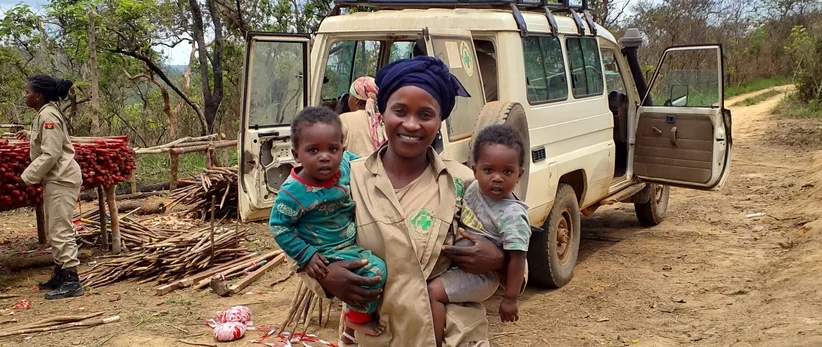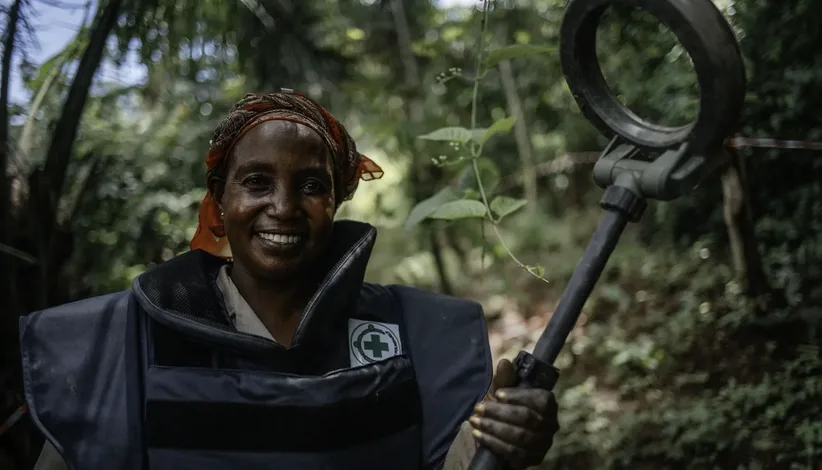Mine action has historically been perceived as a male-dominated field. This stereotype has inevitably created an imbalance in the participation of women in the sector.
It is at times argued that the stereotype could partly be traced to the origin of mine clearance or demining, which was birthed from the military since landmine use, and its subsequent clearance was typically a military undertaking. To date, many militaries remain male-dominated, and so is the mine action sector, which has received criticism for doing little to ensure equal participation of women.
However, with the advent and push for affirmative action for women, the need to improve gender balance by involving more women in management, professional, and technical occupations has seen progress. The global drive for gender balance has been further amplified by other global initiatives like the sustainable development goals that strongly advocate for gender equality and the empowerment of all women and girls by 2030.
Like many sectors, mine action has benefitted from affirmative action initiatives to an extent. Today, in countries such as Angola, more women are involved in mine action, performing various technical and managerial roles.
However, achieving a desirable balance with equal participation between men and women continues to be challenging. Many women remain disadvantaged and faced with various challenges, including balancing work, family, and societal expectations.
This challenge is compounded by the fact that many mine clearance activities are conducted in remote areas, requiring women and men to stay away from their families for extended periods. Cultural norms and perceptions of the roles of women in society and family remain quite strong in many countries, especially in Africa, where demining is conducted. The expectation of a woman to stay at home and tend to the family remains present. These challenges all impact the fair participation of women in mine action.

However, with more countries embracing women emancipation and empowerment coupled with the growing need for both women and men to contribute and support the increasing cost of living at the family level, stereotypes that require women to remain at home as mere caretakers are being challenged. In Angola, many women are increasingly breaking the barriers and seeking employment in traditionally male-dominated employment such as mine action.
This change in trend has seen women such as Ms. Helena Muloco Melonda taking up employment as a deminer. Helena joined the Norwegian People’s Aid (NPA) Mine Action and Disarmament programme in Angola in May 2024 and is currently employed as a deminer, a position she proudly boasts of and enjoys. A mother of three children, she chose to pursue employment as a deminer to ensure that she could contribute to the well-being of her family and take care of her one-year-old twins.
The 35-year-old is originally from the province of Uige, which is 200 km from Bengo province, where she is currently deployed and stays in the field camp with her twin babies and a nanny to support the babies as she works in the minefield. With her twin babies still nursing/breastfeeding, Helena took the difficult decision of bringing them along with her to the field in an environment with very little comfort.
NPA recognizes the need to provide opportunities for women and mothers like Helena. Furthermore, the programme continuously advocates and works towards increasing the ratio of women in its personnel. In its 2023-2025 country strategy, the programme aimed to achieve a 25% representation of women. To date, NPA in Angola employs 29 women out of its 109 employees, representing 26% of staff.
With the Angola labour law providing only three months of maternity leave for women, NPA recognizes the need for mothers to spend additional time with their newborn babies. As such, through its internal human resources policy, the programme provides an additional month of maternity leave for all mothers.
The programme strives to facilitate women’s participation by encouraging female staff to bring their nursing babies to the field and providing individual sleeping tents, separate bathrooms, and toilet areas for men and women in the field. This ensures that deminers like Helena continue to work comfortably and worry less about the well-being of their babies, allowing field-based female staff to continue working and earning a salary and ensuring they can provide for themselves and their families. Additionally, the programme has a dedicated gender focal point who regularly meets with female staff, providing a platform for safe and open discussions about their needs and working conditions.
Helena highlights many challenges when asked about being a mother and a deminer. The nature of her work and the basic living conditions in the field camp do not allow her to move with all three children as she wishes. This creates a constant worry about their well-being in her absence. However, as she noted, “with the need to support my family, I have no option but to sacrifice and work for them”.

These challenges are faced not only by Helena but also by other female staff in the programme. This sometimes takes a toll on their families, and they have to choose between employment and staying home.
As Angola continues to strive towards ridding itself of landmines and other explosive ordnance (EO), the contributions of women such as Helena are important and should be recognized. Continued advocacy and involvement of women in the mine action sector can have an extended impact on ensuring a collective and shared approach to removing EO and improving family- and household-level income and standard of living.
NPA in Angola salutes its female staff for their dedication, sacrifice, and commitment to a noble cause. The programme commits to continuing to encourage and advocate for more involvement and participation of females in its programme activities and strives to achieve a balanced representation between women and men.

